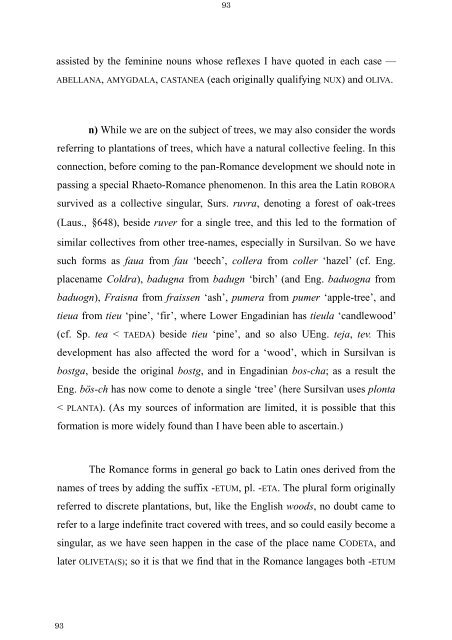The Latin Neuter Plurals in Romance - Page ON
The Latin Neuter Plurals in Romance - Page ON
The Latin Neuter Plurals in Romance - Page ON
Create successful ePaper yourself
Turn your PDF publications into a flip-book with our unique Google optimized e-Paper software.
93<br />
93<br />
assisted by the fem<strong>in</strong><strong>in</strong>e nouns whose reflexes I have quoted <strong>in</strong> each case —<br />
ABELLANA, AMYGDALA, CASTANEA (each orig<strong>in</strong>ally qualify<strong>in</strong>g NUX) and OLIVA.<br />
n) While we are on the subject of trees, we may also consider the words<br />
referr<strong>in</strong>g to plantations of trees, which have a natural collective feel<strong>in</strong>g. In this<br />
connection, before com<strong>in</strong>g to the pan-<strong>Romance</strong> development we should note <strong>in</strong><br />
pass<strong>in</strong>g a special Rhaeto-<strong>Romance</strong> phenomenon. In this area the <strong>Lat<strong>in</strong></strong> ROBORA<br />
survived as a collective s<strong>in</strong>gular, Surs. ruvra, denot<strong>in</strong>g a forest of oak-trees<br />
(Laus., §648), beside ruver for a s<strong>in</strong>gle tree, and this led to the formation of<br />
similar collectives from other tree-names, especially <strong>in</strong> Sursilvan. So we have<br />
such forms as faua from fau ‘beech’, collera from coller ‘hazel’ (cf. Eng.<br />
placename Coldra), badugna from badugn ‘birch’ (and Eng. baduogna from<br />
baduogn), Fraisna from fraissen ‘ash’, pumera from pumer ‘apple-tree’, and<br />
tieua from tieu ‘p<strong>in</strong>e’, ‘fir’, where Lower Engad<strong>in</strong>ian has tieula ‘candlewood’<br />
(cf. Sp. tea < TAEDA) beside tieu ‘p<strong>in</strong>e’, and so also UEng. teja, tev. This<br />
development has also affected the word for a ‘wood’, which <strong>in</strong> Sursilvan is<br />
bostga, beside the orig<strong>in</strong>al bostg, and <strong>in</strong> Engad<strong>in</strong>ian bos-cha; as a result the<br />
Eng. bös-ch has now come to denote a s<strong>in</strong>gle ‘tree’ (here Sursilvan uses plonta<br />
< PLANTA). (As my sources of <strong>in</strong>formation are limited, it is possible that this<br />
formation is more widely found than I have been able to ascerta<strong>in</strong>.)<br />
<strong>The</strong> <strong>Romance</strong> forms <strong>in</strong> general go back to <strong>Lat<strong>in</strong></strong> ones derived from the<br />
names of trees by add<strong>in</strong>g the suffix -ETUM, pl. -ETA. <strong>The</strong> plural form orig<strong>in</strong>ally<br />
referred to discrete plantations, but, like the English woods, no doubt came to<br />
refer to a large <strong>in</strong>def<strong>in</strong>ite tract covered with trees, and so could easily become a<br />
s<strong>in</strong>gular, as we have seen happen <strong>in</strong> the case of the place name CODETA, and<br />
later OLIVETA(S); so it is that we f<strong>in</strong>d that <strong>in</strong> the <strong>Romance</strong> langages both -ETUM









